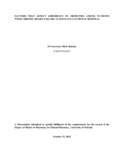| dc.description.abstract | Background: Heart failure is a major health problem with a prevalence of between 1 and 12% in
USA and Europe, and approximately 5.7% in Sub-Saharan Africa. It has emerged as a dominant
cardiovascular disease in Africa and has socio-economic relevance owing to its high prevalence,
mortality and impact on young economically active individuals. In 1999 chronic heart failure
constituted 3.3% of all medical admissions at KNH with rheumatic heart disease reported as the
most common cause
Objective: The purpose of the current study was to determine factors that affect adherence to
treatment among patients with CHF at KNH
Methodology: This was a cross-sectional study involving patients with CHF aged 18 years and
above at KNH. A total of 83 study participants were recruited into the study using a convenient
sampling technique. Data with regard to the study were collected by means of an interviewer
administered questionnaire to eligible and consenting study participants.
Results: Of the 83 study participants, 51(61.4%) were female showing a slightly higher
prevalence of CHF among women than in men. The age of the patients ranged from 18 to 80
years with the majority (n= 37, 44.6%), between 21-40 years. Majority (n=58, 68.9%) of the
patients considered follow-up, acquiescence to medication (n= 64, 77.1%), dietary restriction
(n=59, 72%), regular exercise (n=49 59.0%), smoking cessation (n=59, 71%), and alcohol
cessation (n=58, 69.9%) as very important. Fifty three (63.9%) respondents had complied taking
their medicines at any time. Diuretics were the most commonly prescribed medicines in
treatment of CHF. Majority (n=72, 86.8%) of the study participants were aware of the disease
condition they were suffering from. Valvular heart disease was the most common reported
comorbidity among patients with CHF and 17 (27.9%) of the 61 patients had VHD, 9(14.8%)
had hypertension, 5(8.2%) had anemia, while 4(6.4%) had diabetes mellitus. A relationship was
found between sex and some adverse drug reactions using Pearson chi square test through
bivariate analysis. Sleep disturbances and nausea occurred more in males than females while
headache and drowsiness were more prevalent in females. In all cases the relationships were
statistically significant (p< 0.05)
xiv
Conclusions: Adherence to medicines among patients with CHF is reasonably high at KNH
despite the different levels of education. The pharmacologic therapy of CHF was tilted towards
use of diuretics and cardiac glycosides. Patients’ knowledge level about CHF was generally low
and most patients do not understand fully the implications of lifestyle changes requisite in
management of CHF. Valvular heart disease was the most common comorbidity. Hyponatremia
was the most prevalent electrolyte disturbance and tachycardia, vomiting and rash were the most
common adverse drug effects. | en_US |
| dc.description.department | a
Department of Psychiatry, University of Nairobi, ; bDepartment of Mental Health, School of Medicine,
Moi University, Eldoret, Kenya | |

